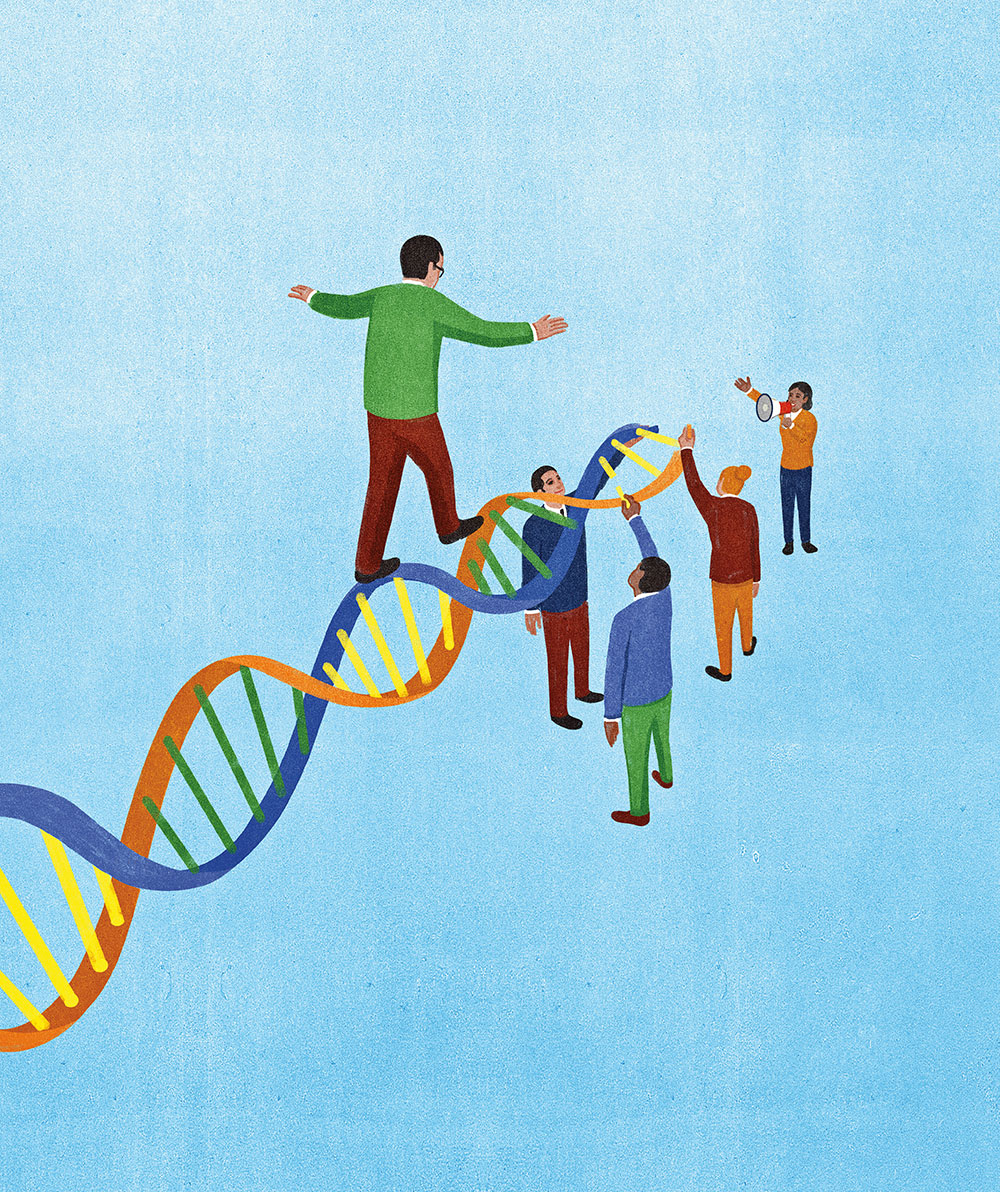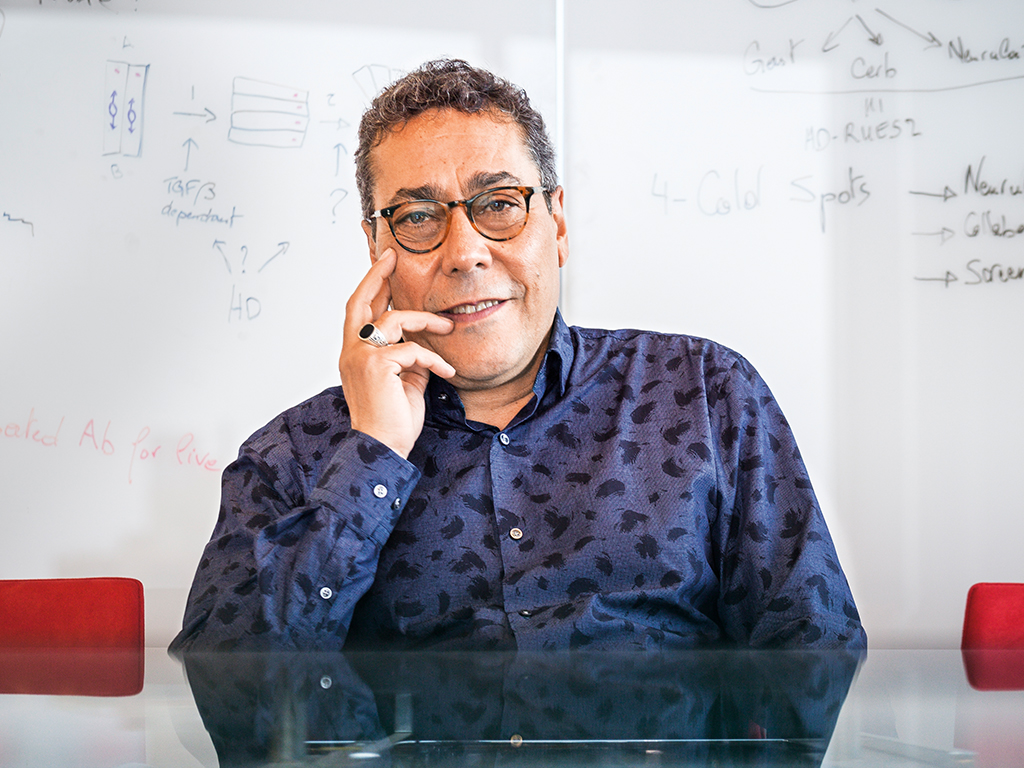
Interview
Science, society, right and wrong
How far should scientists go to obtain new knowledge? We asked Ali Brivanlou, an explorer of human development for whom the question is always top of mind.
By Eva KieslerHe knows a thing or two about boundaries. Ali H. Brivanlou’s life has taken him across cultural and continental frontiers—he grew up in Iran, moved to France at age 17, and has spent the past 35 years in the United States. Moreover, his work has made him keenly aware of different sets of boundaries: scientific ones, which are always expanding, and ethical boundaries, which shouldn’t be crossed.
In 2002, shortly after joining Rockefeller, Brivanlou made a pivotal decision: He abandoned the frog, his long-favored model system, to study development in human embryos and embryonic stem cells.
Developmental biologists tend to be quite fond of frogs. A female frog lays thousands of eggs each day that are big, are easy to see, and develop very quickly, providing an enormously convenient model to study early embryonic development. But for Brivanlou, the frog had taken him as far as it could go. He wanted to understand not just life, but humanity.
Research on human embryos and embryonic cells raises questions across society—from religious concerns about trampling on the sanctity of life itself, to fears that new scientific tools could open the door to “designer babies” or other dystopias. Yet as Brivanlou and others have shown, the field abounds with opportunity to demystify incurable diseases, develop lifesaving therapies, and help people give birth to healthy babies—all of which creates a strong ethical incentive to move it forward.
In recent years, for example, Brivanlou’s lab has developed groundbreaking technology to explore the biology of human embryo implantation. With this technique, scientists now have a way to study one of the earliest stages of development, when a nascent embryo first attaches itself to the uterus (read more in “In an embryo’s second week”). His work has also shed light on the biology of specific developmental diseases such as Huntington’s and has driven new investigations into the causes of pregnancy loss.
Every step of the way, Brivanlou, who is Rockefeller’s Robert and Harriet Heilbrunn Professor, has been inviting dialogue about the possible impacts and risks of his work, integrating scientists’ perspectives with those of people from all walks of life.
We spoke with him about the delicate balance between scientific progress and bioethics.
When you first began studying human development, did you realize how difficult it would be?
I was well aware of the technical and scientific challenges involved, as well as the bioethical ones. In fact, the government policy back then, during the George W. Bush administration, was extremely hostile to research on embryo-derived cells—to the extent that many of my colleagues either left the field or left the country to conduct their work elsewhere. Only a few embryo-derived cell lines had been established, and a ban was put on any further efforts to develop new ones. The injunction was catastrophic for human development research.
Why then, did you persist? It sounds like sticking with frogs would have been easier.
It would have been easier, and I did consider it. The frog is a beautiful model organism, and incredibly useful. Still, when you work in any model system, there comes a time when you pause and ask yourself, “model for what?” And ultimately, the answer is us. For me, it became very important to understand how much of what my colleagues and I had learned in model organisms could actually be extrapolated to humans.
Certainly, some aspects of development are shared by all animals. For example, the early human embryo is shaped more or less like a frog embryo, and similar molecules dictate its overall symmetry, deciding which part will become the head or where the left arm will stick out. But there is also a high degree of species specificity. In fact, once my lab began working in human cells, we were surprised to find that many of the pathways that drive human development are unique to us—confirming that it’s necessary to complement animal studies with research in human cells.

Not everyone agrees on that necessity, however. Pope Francis, for example, has said that nothing—not even research on fatal diseases—justifies the use of human embryos for science. Can you understand this point of view?
I respect this perspective very much. For those who believe, like the Catholics, that life starts at the time of conception, it may follow logically that a fertilized egg can be considered a human being, and hence using it for scientific purposes becomes highly problematic. What all of us have to remember, though, is that we live in a multicultural society where different people will have different perspectives on this issue.
Many Muslims and Jews, for example, believe life begins with the first heartbeat, approximately 40 days after conception. Some Buddhists will say you are essentially an organ until the umbilical cord is cut.
The scientific point of view is that conception marks the beginning of a potential human being, not a human being as such. No new individual will come into being unless an egg is fertilized, but this doesn’t mean a fertilized egg will necessarily produce a baby. In fact, it most likely won’t produce anything at all—a long list of biological events will have to occur, all in the right sequence, for a fertilized egg to become a new person. From a biologist’s standpoint, a fertilized egg has no purpose or finality—it isn’t trying to become anything—so interrupting it at early developmental stages is not the same as taking a life.
All of these viewpoints merit the same degree of consideration, and none should be allowed to dominate at the expense of others.
Given the different perspectives people have, is it even possible to reach common ground?
I think it is, although it often takes time. It’s certainly doable if we understand that the goal is to find ethical common ground, not moral common ground. Ethics and morality are often mistaken to mean the same thing, which causes a lot of confusion.
Morality refers to a person’s individual assessment of what is right and what is wrong, based on his or her upbringing and culture. Ethics, on the other hand, is the integration of moralities held by all the individuals within a society. And in a multicultural society like ours, the pursuit of ethics has to incorporate a broad spectrum of moralities held by people with different backgrounds and educational heritages.
Say, for example, that we want to understand the conditions under which researchers should be allowed to perform a certain experiment, and how we can make sure those conditions are met. These questions should not be answered by scientists alone, just as war is too important to be left to the generals. It is our responsibility as scientists to call on different groups to weigh in and put everyone’s thoughts on the table.
How does this type of bioethics dialogue play out in practical terms?
I’ve served on a number of international panels that seek to shape ethics guidelines for new science. To give you an idea, in one of the recent meetings I attended, more than 100 people came together to discuss ethical issues related to embryology and stem cell research. Only a fraction of us were scientists—which is the way it should be—and the rest were philosophers, social scientists, religious thought leaders, physicians, blue-collar workers, and legal experts, among others.
When everyone’s opinion is adequately represented and respected, we can begin to understand and address individual concerns—using logic, rationalization, brainstorming, and dialogue. Not uncommonly, people’s reservations about new science are rooted in fear.
Humans are naturally afraid of the unknown. Like all other animals, we react with fear to anything we haven’t seen before. And although it’s easy to see how this instinctive fear may once have helped organisms survive and propagate their genes, it can often be a dangerous force in modern human life. Fear of the unknown is the essence of racism and many other social problems.
The good news is that this fear will often dissolve by itself as we gain more knowledge and engage in conversation. It’s natural to be afraid, but it’s also quite possible to overcome it.
Nevertheless, from a philosophical standpoint, some aspects of biology will remain challenging in and of themselves—notably, anything that involves the origin of life or the end of life. We seem to have a hard time dealing with beginnings and endings. Many times, groups of people can reconcile their conceptual differences and move forward, but sometimes they cannot—in which case we must respectfully agree to disagree.
What happens when scientists or other members of society fail to engage in constructive discussion about science ethics?
Unfortunately, we’ve been able to watch this in recent months after He Jiankui, a Chinese scientist, announced to the world that he had used CRISPR technology to create gene-edited babies—experiments that he claims have resulted in the birth of twin girls.
Personally, I will not be convinced until I see the data. I remain very skeptical that such experiments could have been carried out successfully, in China or anywhere else.
More importantly, the recklessness of this supposed pursuit—conducted in a total vacuum of discussion and transparency—is the worst thing that can happen. It has set off a public outrage that could hurt the work of serious scientists for years to come.
You mentioned that fear often undermines people’s trust in science. Is there anything about science that scares you?
Not really. I have seen many awful things, none of which were related to science. I was living in Iran both during the Islamic Revolution and during the Iran-Iraq War. I’ve seen tremendous violence—bombs exploding, people dying right in front of me, destruction everywhere. I know the atrocities human beings are capable of even without genetic engineering or other such innovations, and this scares me more than anything.
Science, I believe, is the opposite of destruction: It can reveal the truth about our existence rather than demolish it. Science is in fact an extension of philosophy, and it’s all about answering the main questions: Where do we come from, what are we doing here, and where are we going? 